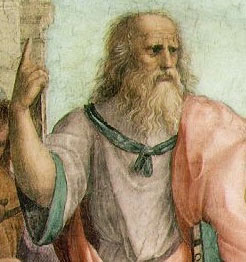Plato on True Knowledge

But when returning into herself . . . [the soul] passes into the other world, the region of purity, and eternity, and immortality, and unchangeableness, which are her kindred, and with them she ever lives, when she is by herself and is not let or hindered; then she ceases from her erring ways, and being in communion with the unchanging is unchanging. And this state of the soul is called wisdom. . . .
The soul is in the very likeness of the divine, and immortal, and intellectual, and uniform, and indissoluble, and unchangeable.
—Plato, The Dialogues of Plato, trans. Benjamin Jowett (Oxford, England: The Clarendon Press, 1892), p. 222. Out of print.
Of the heaven which is above the heavens, what earthly poet ever did or ever will sing worthily? It is such as I will describe; for I must dare to speak the truth, when truth is my theme. There abides the very being itself with which true knowledge is concerned; the colorless, formless, intangible essence, visible only to mind, the pilot of the soul. The divine intelligence, being nurtured upon mind and pure knowledge, and the intelligence of every soul which is capable of receiving the food proper to it, rejoices at beholding reality, and once more gazing upon truth, is replenished and made glad, until the revolution of the worlds brings her round again to the same place. In the revolution she beholds justice, and temperance, and knowledge absolute, not in the form of generation or of relation, which men call existence, but of knowledge absolute in existence absolute; and beholding the other true existences in like manner, and feasting upon them, she passes down into the interior of the heavens and returns home. . . .
—Plato, Phaedrus, trans. Benjamin Jowett (Oxford, England: The Clarendon Press, 1892).
